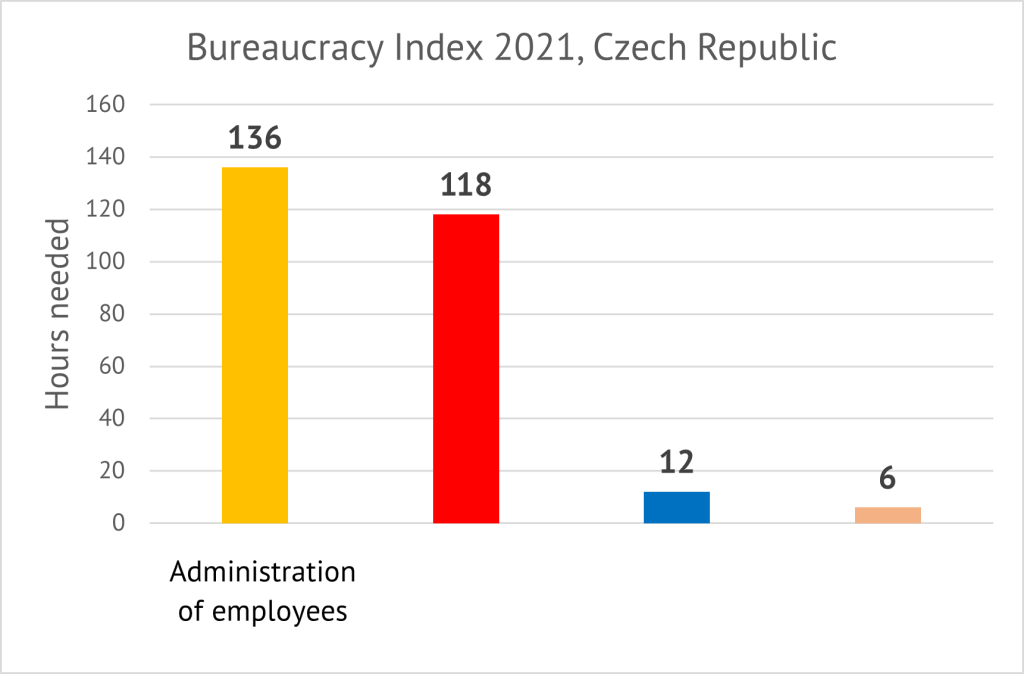Unfortunately, we will not celebrate the fifth year of the Bureaucracy Index in the Czech Republic with a reduction in the administrative burden. The bureaucratic burden on small businesses increased by 49 hours year-on-year to 272 hours.
“The government’s failure to deal with the pandemic in 2021 has proved problematic and has been reflected in a number of chaotic regulations. These also impacted entrepreneurs and, in addition to the financial costs, cost entrepreneurs their time,” says Pavel Peterka, chief economist at the Roklen financial group and analyst at the Liberal Institute.
Using a transparent methodology, the Bureaucracy Index calculates the time burden of all known state-imposed administrative obligations that a small business must meet during one year of operation. The relatively simple methodology allows the Liberal Institute to annually remeasure the results and compare them over time and with foreign countries.
The results are concrete and describe the real situation of a small business in the Czech Republic, making them a suitable tool for describing the business environment in the Czech Republic.
“It is sad that in the average company, one employee spends seven weeks working for the state and not for the customer,” says Martin Pánek, director of the Liberal Institute.
“This inflexibility and the need to have the state’s stamp on everything is then negatively reflected, especially in a crisis like the one we experienced just last year,” he adds.
The worsening of the Czech Republic’s bureaucracy index score in 2021 was mainly due to administratively demanding requirements related to mandatory testing of employees in the company. The most problematic was not the employee testing itself, which would have taken place at least with some frequency in firms even without the state-imposed obligation.
Communication with the responsible public authorities, record keeping and mandatory archiving of the results appeared to be problematic. Regular research into the information on the applicable anti-pandemic regulations also proved to be time-consuming. The information was often difficult to trace and there were numerous changes.
“The state was tasked with making transparent and predictable decisions in the area of anti-pandemic measures and informing the public about these decisions in a timely manner. Predictability and stability are crucial to managing such a situation. However, in this role, the state has completely failed,” Pavel Peterka comments on the government’s performance during the pandemic.
This year, in addition to the Czech Republic, the index was also published in its home country of Slovakia, where the total bureaucratic burden came to 225 hours (eight more than last year), and for the first time in Northern Macedonia, where it came to 146 hours.
“Regulation is a kind of tax. It generates deadweight loss in the form of lost time on paperwork, which came to 272 hours this year, and it generates deadweight loss in the form of lost productivity on the part of employees and entrepreneurs who have to sit over forms and forms instead of doing their own work. This then translates into a narrower range of products and higher prices faced by customers.
In the long run, lower productivity means not only slower economic growth, but also, thanks to a more rigid market, less innovation, and greater inequality as new players find it harder to enter particular sectors,” Jan Mošovský, research director at the Liberal Institute, put the results in a broader context.
The Bureaucracy Index only includes in the calculation the bureaucratic burden based only on activities required by law. In order for a model firm’s activity to be included in the bureaucratic burden category, it must meet two conditions:
- The activity is required by a regulatory framework or other relevant public authority or body.
- The activity fails the market test. These are activities that the firm would carry out even without the legal obligation.
For more information on the calculation methodology and international results, visit bureaucracyindex.org
| Year | Number of hours spent on bureaucracy |
| 2017 | 247 |
| 2018 | 233 |
| 2019 | 226 |
| 2020 | 223 |
| 2021 | 272 |
Continue exploring:
Third Way? Social Market Economy: Between Laissez-Faire and Interventionism




